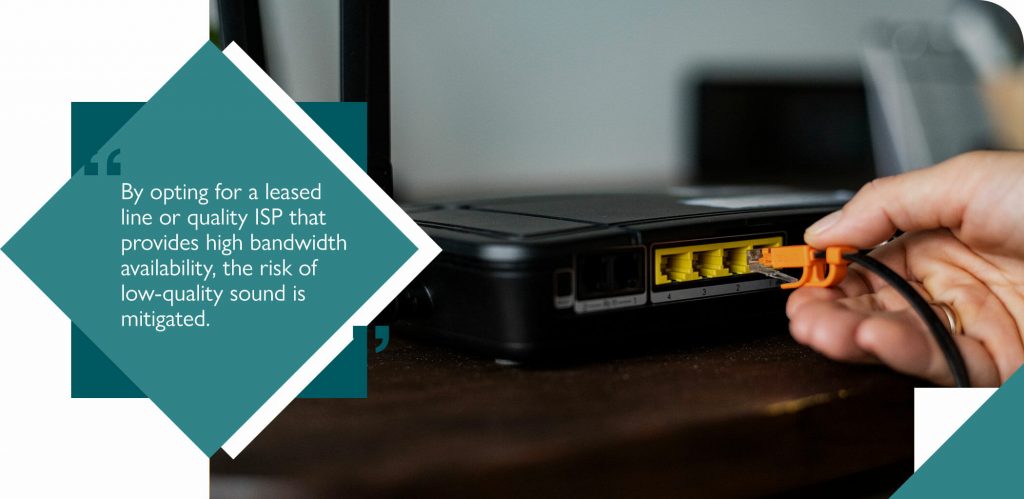If you’re considering moving to a VoIP phone solution, you’re not alone. The system is quickly gaining in popularity with thousands of businesses across the country now using VoIP rather than traditional phone lines. But before you make the switch, it’s worth researching VoIP advantages and disadvantages to make sure it’s the right move for you.
What is VoIP?
VoIP stands for Voice Over Internet Protocol and is often referred to as IP (internet) telephony or cloud-based telephony. In plain terms, VoIP systems make phone calls using the internet, rather than the traditional telephone exchange or landline network. As well as audio calls, some VoIP set-ups can be used for multimedia sessions, such as video calls.
The system works by converting analogue voice signals into digital data and allows for calls to be made under any circumstances, as long as there’s a working internet connection. Calls can be both placed and received via computer, tablet or mobile phone. However, internet telephony typically uses traditional-looking handsets to make calls; the only difference is that the handset will be connected to the internet port rather than a telephone socket.
VoIP advantages for businesses
VoIP systems can be a fantastic alternative for businesses who want to lower their costs and improve the quality of their conference calls. In theory, a VoIP system allows thousands of people to participate in a single conference call. So, they can be a great solution for businesses (no matter how large or small) as well as for home or personal use.

VoIP advantages
Cost: VoIP can offer a cheap and cost-effective alternative to regular phone contracts. Instead of having two separate bills with a telephone provider and an internet provider, you’ll have a singular broadband contract. Furthermore, with most contracts, you’ll have free calls between your company locations and only minimal charges for international calls.
Portability: VoIP is not distance or location-dependent, meaning that you’ll be able to take your VoIP phone system with you wherever you go, providing that your device is configured to the office system. Cloud-based telephony is just as accessible as your email inbox; all you’ll need is a compatible device, an internet connection and possibly a headset. This means that even employees who work remotely can upkeep levels of productivity, allowing for improved business efficiency and flexibility.
Scalability: VoIP gives businesses the potential for high-quality, large-scale conference calls. Users can be easily added or removed to your network as and when required; often you’ll just pay for the number of users you have. This makes VoIP an attractive option for developing companies, who would prefer a phone system that has the capability to grow with their business.
Sound quality: As long as you have a reliable and stable internet connection, the sound quality should be excellent, matching or improving the quality compared to regular telephone calls.
Bonus features: Another advantage of VoIP is the extra functionalities it offers, such as call forwarding, call recording, call queues and call transfer. These functions are designed with business users in mind, allowing for improved call routing efficiency and reducing unnecessary time on the phone.
VoIP disadvantages
Despite the potential to offer a low-cost, highly effective calling system, VoIP does come with its disadvantages. Cloud-based telephony is entirely dependent on the internet, meaning that you will need a reliable, high-quality internet connection with sufficient bandwidth availability.
(Tip: It is important to note that it is the quality of your broadband that matters, rather than the speed.)

Latency: Problems with latency can affect the quality of calls made through the VoIP system, particularly if you’re relying on a shared internet connection. However, if you have a private internet connection or a dedicated business broadband, the quality of calls should not suffer. By opting for a leased line or quality ISP that provides high bandwidth availability, the risk of low-quality sound is mitigated.
Emergency situations: If there is a loss of power during an emergency, you won’t be able to make an urgent call using the VoIP system. This means businesses are often required to have a back-up landline telephone for emergency situations, as the local telephone exchange network is not affected by power outages. However, with most people now having mobile phones, the likelihood of being unable to contact an emergency operator is low.
From our analysis, it seems clear that VoIP advantages largely outweigh any systematic disadvantages. Here at Structured Communications, we offer high-quality, affordable VoIP contracts to allow your business to grow, flourish and thrive. If you’re interested in switching to a VoIP system, make sure to have a look at which services we can offer you.
For more information, please do not hesitate to get in touch.

